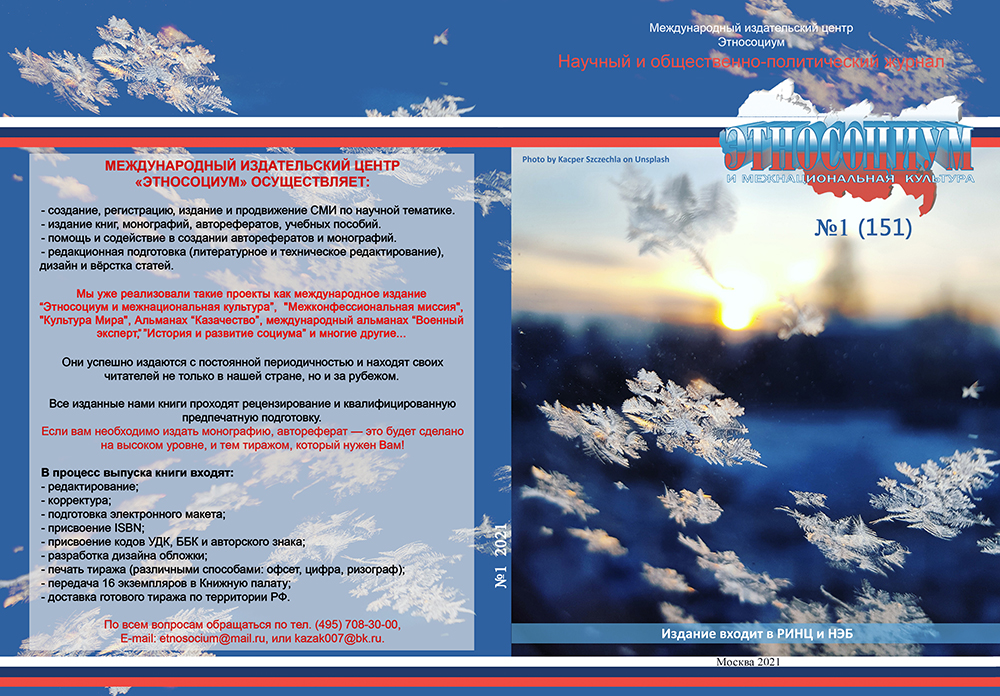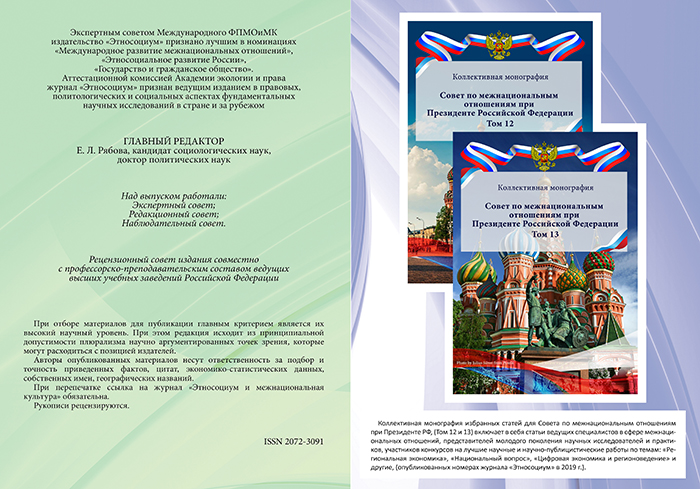

Content
|
COUNCIL OF INTERNATIONAL RELATIONSHIP
|
|
|
Biryukov S.V., Ryabova E.L. The phenomenon of leadership in the context of modern crises and challenges
|
9
|
|
ACTUAL PROBLEMS OF MODERN SOCIETY
|
|
|
Tkachenko E.N. The higher education system as a factor of innovative development
|
21
|
|
Ternovaya L.O. Color and labor: a chromatic approach to assessing HR security
|
29
|
|
Ryabova E.I. Sport is an instrument of geopolitics
|
38
|
|
Gryaznov S.G. Professionalization of conductors as a basic component of preserving traditions and developing musical performance
|
47
|
|
REGIONAL STUDY
|
|
|
Gioeva E.P., Abaeva I.V., Gazzaeva N.M., Khabaeva L.M. Psychological characteristics of the ideas of South Ossetian youth about the resilience of the individual
|
53
|
|
Song Wenjun Comparative analysis of ethnopolitical conflicts (on the example of the Ossetian-Ingush conflict and the conflict in Biryulevo)
|
69
|
|
INTERNATIONAL RELATIONSHIPS
|
|
|
Kazanin M.V., Abdrakhmanova A.R. Development of the PRC missile defense system as an element of ensuring national security
|
75
|
|
Fais-Leutskaia O.D. Covid-19 in Italy-first wave: terms and moods
|
87
|
|
Polonchuk R.A. Military cooperation between Russia and China
|
95
|
|
Askerova E.F. The current state of relations between the United States and Turkey
|
106
|
|
Tambi S.A. Estonian Diaspora in the Gdov Region
|
111
|
|
Abstracts
|
151
|
|
Authors
|
159
|
|
Requirements to materials submitted to the international publishing house "Etnosocium"
|
163
|
The article examines the transformations of the phenomenon of political leadership in the situation of modern crises and challenges associated with the crisis of the world economy, the weakening of state institutions, the expansion of social networks and the so-called "mass society". The emphasis is placed on the consideration of changes in the level of demand for the well-known types of political leadership in today”s world, in the conditions of the most significant functions performed by political leaders, as well as the prospects for political leadership as such. The authors come to the conclusion that changes in the forms, manifestations and features of the functioning of political leadership will continue, and it is premature to talk about the death or "simulacrum" of this political institution.
Keywords: political leadership, social transformations, political crises, dysfunctions, self-positing.
The article deals with certain aspects of the participation of universities (as structural elements of the national education system) in the innovative development of the country. The main directions of the influence of universities on socio-economic processes are highlighted, examples of effective generation of innovations and their commercialization are given.
It is concluded that sustainable socio-economic development and the formation of human capital is impossible without the participation of educational organizations (mainly higher professional education), which makes them an important factor in innovative development.
Keywords: higher education, innovation, development, driver, interaction, cooperation.
People have long known many sign systems. One of them is color. It was originally used to reflect the unique characteristics of mythical objects. Then its range was expanded by transferring the most important properties of the world around a person. Later, color positions began to distinguish a person's life choice: clothes of a particular color marked his desire to serve the church, be in the army or be a doctor. These professional areas were the first to receive their color indexing. In the XX century. in the labor market, color began to indicate not only the area of application of efforts, but also the achieved position. By now, the number of colors that characterize different professional fields makes up an exceptionally rich palette. At the same time, the possibilities have expanded not only to use color to achieve success in the service, but also to stigmatize employees through color characteristics. All these positions force us to consider the role of color as a component of the personnel security system.
Keywords: labor market, symbols, color indicators, professional growth, stigmatization, social hierarchy.
This article is a reflection on the interaction of geopolitics and sports related to the publication of the monograph "Geopolitics of Sports". The article identifies ten main reasons that make the connection between geopolitics and sports relevant.
Keywords: sports, geopolitics, soft power, the Olympic Games, international relations, foreign policy, healthy lifestyle.
The article is devoted to the analysis of the issues of professional formation and development of orchestral conductors; the allocation of priorities in improving professional skills, taking into account the preservation of traditions and the development of musical performance; emphasizes the importance of mentoring in the training of conductors, the importance of developing a conducting culture.
Keywords: conductor, conducting skills, conducting culture, musical performance, professionalization of conductors, traditions and innovations in the art of conducting.
The purpose of the study is to identify the leading characteristics of ideas about the resilience of the personality of the youth of the Republic of South Ossetia. The theoretical basis of the study was the theory of social representations and the theory of personal resilience. Scientific novelty is determined by the specificity of the social community in which the study was conducted. As a result, the structural components of the studied representation, as well as the personality qualities that contribute to it, are revealed.
Keywords: resilience, structural components of personal resilience, social representations, personal qualities, personal mottos.
Analysis of historical processes in the development of socio-political relations indicates the presence of ethnic differences outside the time and localization framework. Ethnopolitical conflicts as factors of changes in the socio-political environment were studied by the classics in the field of political thought. It is important to note that conflicts in the modern world are going through a stage of transformations, helping to identify and reveal various shortcomings of the legal system, building social policy and problems in the field of national security. At the same time, the level of interethnic tension is not decreasing rapidly, conflicts on ethnic grounds continue to arise, which contributes to the deformation of society as a whole, and also requires special regulatory measures taken by the state.
In addition, the ethnopolitical form of emerging contradictions has preconditions, as well as causes and consequences of conflicts on the basis of political, economic interethnic delimitation. In this case, one should rely on historical experience and identify the most important factors influencing ethnic differences that are interconnected with socio-political processes. There is a need to analyze one of the most significant conflicts for Russia, the Ossetian-Ingush and ethnic-everyday conflict in Biryulyovo, which certainly does not have such a scale, but it points out the factors of the emergence of conflicts, and also shows the common and different between the two links of conflicts. In accordance with the above, the author makes an attempt to highlight the factors of ethnopolitical conflicts, conducting a comparative analysis of ethnopolitical conflicts of different orientations and scales, which, in turn, helps to identify gaps in the field of national security in the Russian Federation during the period of globalization.
Keywords: ethnopolitical conflict, Ossetian-Ingush conflict, conflict in Biryulyovo, factors of ethnopolitical conflicts, national security of the Russian Federation.
Current article is describes the evolution of the early warning system for a missile attack in the PRC, its significance for ensuring the country's national security in the context of the development in the United States of means of a sudden missile strike. The principles and postulates laid down by the theorist of state administration Sun Tzu served as the basis for the development of the concept of national missile defense. The options for the formation of the PRC missile defense system, taking into account the economic factor, are presented.
Keywords: national security, principles of military strategy, missile defense, early warning, satellites, radar stations, ballistic missiles.
The present article is devoted to new terms that have emerged in Italy in the context of the coronavirus pandemic and the realities behind them. In particular, it deals with the aggravation of the confrontation that existed in the country between certain regions (North and South of Italy), as well as about its reflection in the minds of the population of these regions and the formation of new mental stereotypes in the "coronavirus" context.
Keywords: Covid-19, terms, Italy, the regions, confrontation.
The article examines the main directions of military cooperation between Russia and China. Based on the analysis of domestic and foreign sources, the author examines the military-political and military-technical interaction of the two countries at the present stage of development. The most problematic aspects of this type of cooperation are identified, possible ways of further diversification of both military and military-technical cooperation between the Russian Federation and the PRC are proposed.
Keywords: military cooperation, military-technical cooperation, Russia, China, military-political interaction, arms export.
The article examines the modern aspects of the relationship between the United States of America and Turkey. The main starting points that have caused the intensification of tension in the relationship are indicated. Among them, the following are noted: the Kurdish issue, the Syrian issue, the authoritarian style of government of Turkish President Erdogan, the purchase of S-400 by Turkey from Russia, the ever-increasing independence in resolving regional issues. Erdogan accepts the rules of the game in the international arena, shaped by the United States, based on force, and focuses on increasing the country's independence, strengthening its armed forces and subordinating them to the president. Turkey is becoming an increasingly visible player in the foreign policy arena, which raises concerns among US officials, who are assigning Turkey a deterrent role in the regional balance of forces and using its territorial capabilities. At present, the relationship between the two deities should be assessed as based on the achievement of their own interests. At those points where interests converge, it is possible to reach a consensus.
Keywords: Turkey, USA, Erdogan, Trump, S-400, NATO.
In this historical and ethnographic study, the author describes the cultural, religious and economic life of the Estonian community of Gdov Region (now the Gdov District is part of the Pskov Oblast). The novelty and uniqueness of the study lies in the fact that so far no scientific research has been carried out on such topics as “Famous residents of Gdov Region from among the Estonian settlers” and “History of the Estonian community in the city of Gdov”, which are presented in this comprehensive study. The author has collected, systematized and for the first time introduced into scientific circulation a rich material of pre- and post-revolutionary archival publications in Estonian language, as well as a variety of periodical publications.
Keywords: Russia, Gdov, Estonians, Estonia.